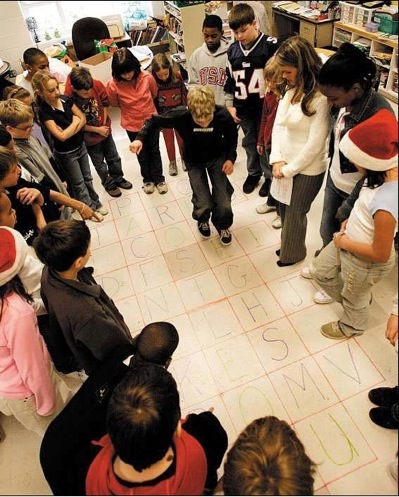Clips


Alex Hatton’s classmates watch him play spelling hopscotch in Cindy Rickert’s fifth-grade class – a hub of motion that focuses on brain-based learning. (L. Todd Spencer/The Virginian-PIlot)
BY LAUREN ROTH
THE VIRGINIAN-PILOT
JAN. 2, 2007
VIRGINIA BEACH — The catchy beat of “Let’s Get It Started” pulsated from a portable CD player as fifth-graders spilled through the doorway.
A student fanned the pages of a math quiz and tossed the stack into the air, sending her classmates scrambling on hands and knees to grab them.
Ten- and 11-year-olds hopped on molded blue chairs and broke into the chicken dance after answering the first quiz question.
The unwritten rule of school decorum – that learning takes place when teachers instruct students in quiet classrooms – has been discarded by two teachers at Christopher Farms Elementary School.
Cindy Rickert and Emma Jeter have remade their joint classrooms into hubs of motion and music.
“I like to come to school because I know we’re not just going to do the same thing,” said student Natalie Rivas.
Jeter and Rickert’s 48 students – 24 per class – have responded well to the new style. On quarterly reading tests, class averages have risen 4 to 21 percentage points in each category since the beginning of the school year. Their average math scores nearly match the school’s fifth-grade gifted classes.
The teachers are especially encouraged because eight of their students have learning disabilities. This is the first year that Christopher Farms merged its students with disabilities into classes with their peers for the entire day.
“They’re constantly engaged and working toward something,” said Brandon Elliott, a special education teacher who works full time in Rickert and Jeter’s classrooms.
Frequent teamwork also helps students feel more at ease about asking questions, he said.
“It takes the fear out,” he said.
Rickert, who teaches language arts and social studies, and Jeter, who teaches math and science, were inspired by a seminar they attended this summer for Virginia Beach public school teachers.
There, Rich Allen, an expert on learning and the brain, explained how the use of music and movement can help students learn.
“I think it just makes your brain work better if you’re not sitting all the time,” said student Hannah Rios. “If you get up and dance, and you have fun. It makes you want to start a lesson.”
To fully embrace the ideas, Jeter and Rickert rewrote virtually all of their lessons before school started.
They tossed reading comprehension worksheets in favor of group activities, such as illustrating parts of a story in comic strip panels. Revolutionary War facts are set to the tune of “Little Drummer Boy.” Test questions about the oceans are framed as factoids acted out with memorized hand signals.
Jeter drills students on multiplication using a grid of numbers drawn on the floor. Students rush to the correct answer, sometimes crashing head-on.
“When I ask what they did in school, I never get the answer ‘nothing,’” said Regina Spach, whose twin daughters Elizabeth and Danielle, are in Rickert and Jeter’s classes. “Every night is like dinner theater. Whether it’s about the oceans or the Colonies, there’s a song to it.”
School staffers often poke their heads into Jeter and Rickert’s classes. Sometimes they end up dancing with the students.
“It’s like learning and recess at the same time,” said fifthgrader Keegan Grinspoon. “At my old school, we just sat around, read books and did worksheets.”
Although the benefits seem evident, few local teachers use so many brain-based techniques at once, said Ron Nash, who trains teachers for Beach schools. Allen, who led the summer seminar, said teachers are trying his techniques all over the world.
“When you learn to teach, you hear about control,” Jeter said. “One of the things that’s hard is letting them talk to each other a lot.”
And with so much group work, there’s less of a paper trail for every child.
“That can be scary as a teacher,” Rickert said.
Instead, the teachers closely observe their students. They also reinforce concepts that their students struggle with on quizzes and tests.
Karen O’Meara, who specializes in staff mentoring for Virginia Beach schools, said that in 25 years, she’s never seen a more effective classroom environment.
“One little girl took me aside and said, ‘Please allow our teachers to keep teaching this way,’” O’Meara recalled from a recent visit to the class.
Other teachers have been invited to observe Rickert and Jeter’s classes, and Allen plans to conduct more seminars in South Hampton Roads next year.
Even if the students move on to more traditional teachers, Christine Matherne said the lessons of this year will stick with her son, Dalton.
His reading has improved, he’s enthusiastic about school, and he’s learned new ways to memorize facts, she said.
“He’s going to take that with him,” she said.
Lauren Roth, (757) 222-5133, lauren.roth@pilotoline.com

